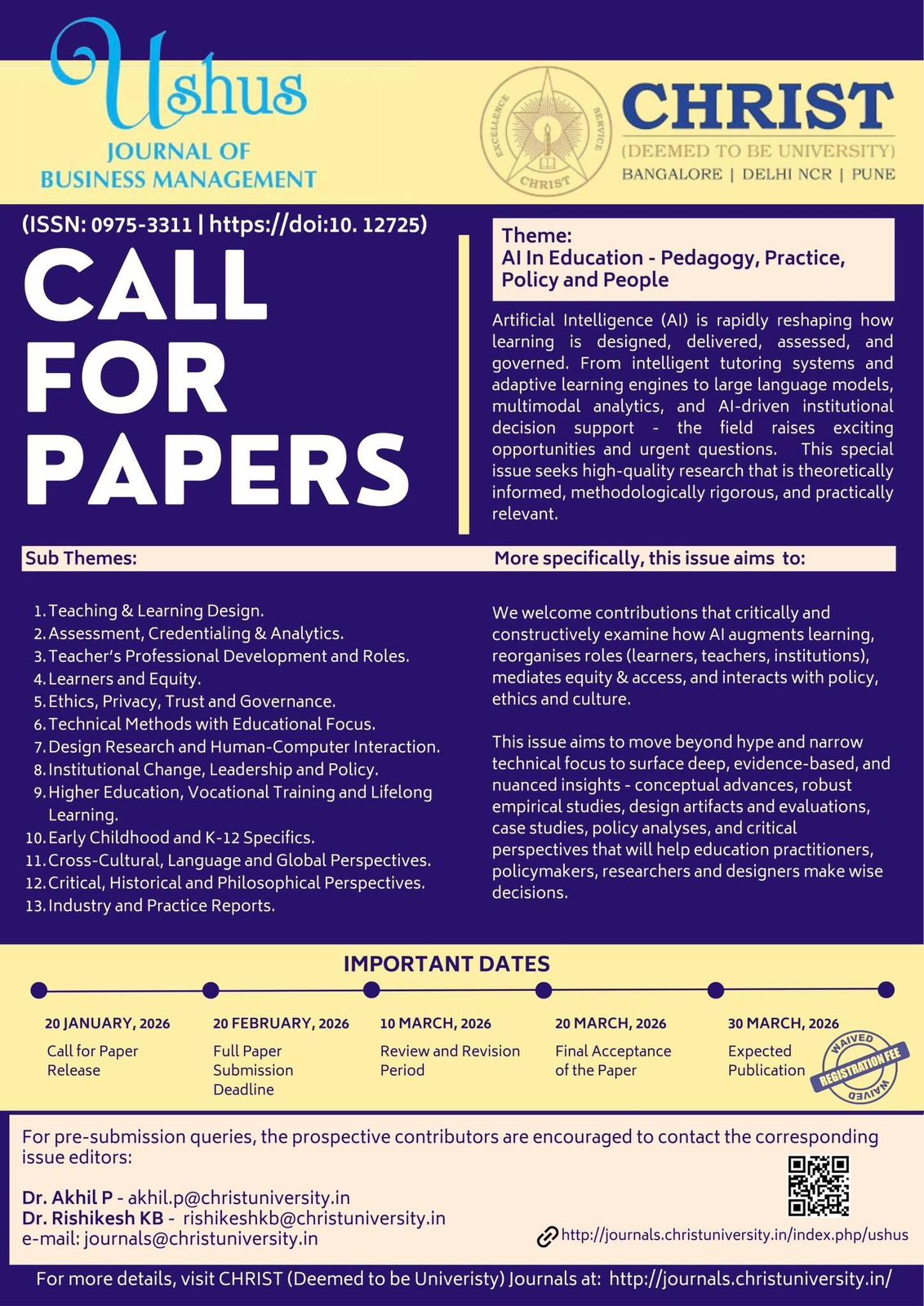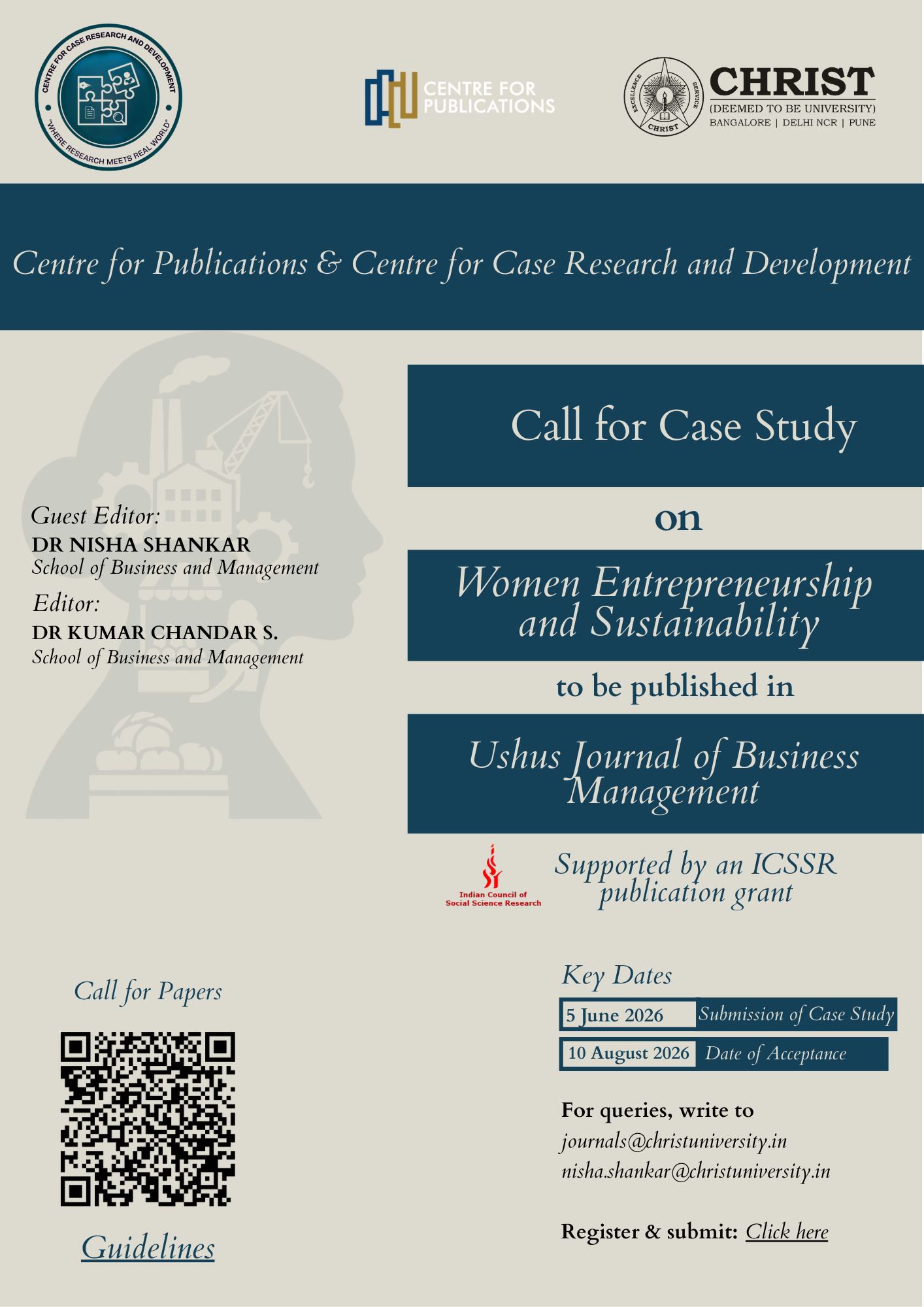From Battlefield to Boardroom: The Gita’s Guide to Effective Management
DOI:
https://doi.org/10.12725/ujbm.72.1Keywords:
Bhagavad Gita, Management Philosophy, Ethical Leadership, Karma Yoga, Organizational BehaviourAbstract
The contemporary management theory increasingly borrows from ancient wisdom to address the current complexity and moral dilemmas in organizations. This study systematically examines the Bhagavad Gita's contribution to management practice in present-day scenarios, fostering a holistic management theory integrating ancient wisdom with modern organizational necessity. The study uses a hermeneutical research method to uncover nine interrelated management principles articulated in the philosophical discourse of the Gita: Karma Philosophy (process-oriented action devoid of attachment to outcome), Leadership by Service (servant leadership), Decision-Making by Wisdom (buddhi-yoga enabling ethical decision-making), Emotional Intelligence and Mental Toughness (sthitaprajna enabling balanced leadership), Organizational Behaviour and Team Management (swadharma role alignment), ethics and Corporate Governance (integrity through dharma), Strategic Thinking and Vision (equanimous long-term planning), Change Management (acceptance of impermanence), and Conflict Resolution and Communication (dialogue and mediation through principled approaches). Comprehensively breaking the barriers of disciplines, Krishna guided Arjuna so as to provide teachings relevant to a modern manager facing predicaments of leadership, motivation, and ethics. In stark contrast with traditional management models that rely on quantitative measures and short-term benefits, the Gita provides a holistic framework that emphasizes inner transformation, emotional intelligence, and value-based leadership. The study observes that this ancient philosophy, where organizations not only create structures that are effective but justice-driven cultures that endure through time.
References
Agarwalla, S., Seshadri, B., & Krishnan, V. R. (2015). Impact of Gunas and Karma Yoga on Transformational Leadership. Journal of Human Values, 21(1), 11–22. https://doi.org/10.1177/0971685815569590
Alhatmi, B. S. (2020). Impact of strategic thinking on high performance work practices (Doctoral dissertation, University of Portsmouth).
Ashokkumar, S. (2014). Thoughts on business ethics and corporate social responsibility from Vedic literature. Journal of Human Values, 20(1), 11–18. https://doi.org/10.1177/0971685813513607
Bhadeshiya, H. B., Shukla, P., & Muniapan, B. (2023). The relevance of Satvik management model from the Bhagavad Gita for business sustainability. International Journal of Indian Culture and Business Management, 28(2), 245–263. https://doi.org/10.1504/IJICBM.2023. 129009
Bhatia, S., Madabushi, J. S., Kolli, V., et al. (2013). The Bhagavad Gita and contemporary psychotherapies. Indian Journal of Psychiatry, 55(6), S315–S318.
Bikmetov, E., Galimullina, N., Ruvenny, I., et al. (2020). Strategic thinking as a factor of sustainable development of the organization. Journal of Critical Reviews, 7(12), 174–179.
Chatterjee, D. (2024). A critical analysis of the psychological concepts in the Bhagavad Gita. Unpublished manuscript.
Chauhan, R., Maheshwari, N., & Goswami, N. G. (2020). Role of Guna and emotional intelligence on work-life balance and job satisfaction among female professionals. Journal of Business and Management, 22(1), 40–46.
Dhillon, M. (2023). Weaving together the ancient and the contemporary: Intersections of the Bhagavad Gita with modern psychology. Journal of Indian Psychology, 41(2), 101–113.
Dhillon, M. Weaving Together the Ancient and the Contemporary: Intersections of the Bhagavad Gita with Modern Psychology. Pastoral Psychol 72, 525–537 (2023). https://doi.org/10.1007/s11089-023-01070-2
Garg, R., & Saluja, D. (2017). A business paradigm for corporate Shubh–Labh: An inquest study. Indian Journal of Commerce and Management Studies, 8(2), 1–8.
Ghag, N., Sonar, H., & Chaudhary, G. (2024). Altruism in management education: A closer look at yoga-based practices. Purushartha: A Journal of Management, Ethics and Spirituality, 17(1), 35–44.
Hajela, A. (2013). Environmental turbulence: Samasraya as response model. Journal of Human Values, 19(1), 15–24.
Jeste, D. V., & Vahia, I. V. (2008). Comparison of the conceptualization of wisdom in ancient Indian literature with modern views: Focus on the Bhagavad Gita. Psychiatry: Interpersonal and Biological Processes, 71(3), 197–209. https://doi.org/10.1521/psyc.2008.71.3.197
Kaipa, P. (2014). Making wise decisions: Leadership lessons from Mahabharata. Wisdom Leadership Institute.
Kapadia, M. (2013). Revisiting yoga sutras for innovative paradigms in OD or creating human model for organizations. Purushartha: A Journal of Management, Ethics and Spirituality, 6(1), 1–8.
Kaul, V. K. (2012). Strategic management planning and growth strategies. Excel Books India.
Kumar, N. (2017). Bhagavadgeetha in Professional Life. South Asian Journal of Human Resources Management, 4(2), 218-224. https://doi.org/10.1177/2322093717732207 (Original work published 2017)
Low, K. C. P., & Muniapan, B. (2011). The essential leadership wisdom of the Bhagavad Gita. International Journal of Indian Culture and Business Management, 4(5), 506–520.
Low, P. K. & Muniapan, B. (2011). The Essential Leadership Wisdom of the Bhagavad Gita. International Journal of Asian Business and Information Management (IJABIM), 2(4), 1-9. https://doi.org/10.4018 /jabim.2011100101
Lumpkin, A., & Achen, R. M. (2018). Explicating the synergies of self‐determination theory, ethical leadership, servant leadership, and emotional intelligence. Journal of Leadership Studies, 12(1), 6–20. https://doi.org/10.1002/jls.21566
Modh, S. (2014). Formulating a new three energy framework of personality for conflict analysis and resolution based on Triguna concept of Bhagavad Gita. Indian Journal of Applied Research, 4(8), 365–367.
Mukherjee, S. (2017). Bhagavad Gita: The key source of modern management. IOSR Journal of Business and Management, 19(6), 1–4.
Muniapan, B. (2008). Kautilya’s Arthashastra and perspectives on organizational management. Asian Social Science, 4(1)
Muniapan, B., & Satpathy, B. (2013). The ‘Dharma’ and ‘Karma’ of CSR from the Bhagavad-Gita. Journal of Human Values, 19(2), 173-187. https://doi.org/10.1177/0971685813492265 (Original work published 2013)
Muniapan, B., & Satpathy, B. (2013). The ‘Dharma’ and ‘Karma’ of CSR from the Bhagavad-Gita. Journal of Human Values, 19(2), 173–187. https://doi.org/10.1177/0971685813478595
Natesan, N. C., Keeffe, M. J., & Darling, J. R. (2009). Enhancement of global business practices: Lessons from the Hindu Bhagavad Gita. European Business Review, 21(6), 546–561.
Nayak, A. K. (2017). Effective leadership traits from Bhagavad Gita. Journal of Strategic Human Resource Management, 6(2), 15–18.
Nayak, A. K. (2018). Effective leadership traits from Bhagavad Gita. International Journal of Indian Culture and Business Management, 16(1), 1. doi:10.1504/ijicbm.2018.088593
Parthasarathi, S. K., Rao, K. V. S. R., & Reddy, P. N. (2016). Spiritual leadership and its contribution to soft dimensions of total quality management – Relevance to micro, small and medium enterprises in India. Asian Journal of Management, 7(1), 1–7.
Ramani, P. (2024). A comparative analysis of self-realisation in the Bhagavad Gita with psychology and philosophy and its educational implications. International Journal of Indian Psychology, 12(2), 202–216.
Rastogi, A., & Pati, S. P. (2015). Towards a conceptualization of Karma Yoga. Vikalpa, 40(3), 193–207. https://doi.org/10.1177/0256090915601210
Satpathy, B., & Muniapan, B. (2009). The knowledge of “Self” from the Bhagavad-Gita and its significance for human capital development. Proceedings of the 8th International Conference on Human Resource Development Research and Practice Across Europe, 1–11.
Tenneti, V. J., & Tenneti, M. (2022). Karma Yoga: The science of human excellence. Journal of Human Values, 28(3), 229–236. https://doi.org/10.1177/09716858221128223
Thaker, K. B. (2010). Management control and strategy implementation: Insights from Mahabharata. Purushartha: A Journal of Management, Ethics and Spirituality, 3(1), 1–8.
Downloads
Published
How to Cite
Issue
Section
License
Copyright (c) 2025 SUBHABRATA MITRA, Anirban

This work is licensed under a Creative Commons Attribution-NonCommercial-NoDerivatives 4.0 International License.



